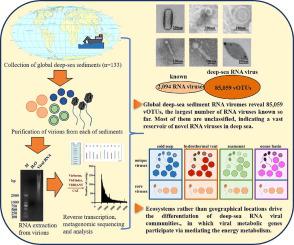Journal of Advanced Research ( IF 11.4 ) Pub Date : 2023-04-11 , DOI: 10.1016/j.jare.2023.04.003 Xinyi Zhang 1 , Haitao Wan 1 , Min Jin 2 , Liquan Huang 1 , Xiaobo Zhang 1

|
Introduction
Viruses are the most abundant and diverse life forms on the earth. Both DNA viruses and RNA viruses play important roles in marine ecosystems via regulating biogeochemical cycles.
Objectives
However, the virome of marine RNA viruses has been rarely explored so far. In this study, therefore, the environmental viromes of deep-sea sediment RNA viruses were characterized on a global scale to reveal the global virosphere of deep-sea RNA viruses.
Methods
The viral particles were purified from each of 133 deep-sea sediment samples and then characterized based on metagenomes of RNA viruses.
Results
In this study, we established the global virome dataset of deep-sea RNA viruses purified from 133 sediment samples that were collected from typical deep-sea ecosystems of three oceans. A total of 85,059 viral operational taxonomic units (vOTUs) were identified, of which only 1.72% were hitherto known, indicating that the deep-sea sediment is a repository of novel RNA viruses. These vOTUs were classified into 20 viral families, including prokaryotic (7.09%) and eukaryotic (65.81%) RNA viruses. Furthermore, 1,463 deep-sea RNA viruses with complete genomes were obtained. The differentiation of RNA viral communities was driven by the deep-sea ecosystems as opposed to geographical region. Specifically, the virus-encoded metabolic genes took great effects on the differentiation of RNA viral communities by mediating the energy metabolism in the deep-sea ecosystems.
Conclusions
Therefore, our findings indicate that the deep sea is a vast reservoir of novel RNA viruses for the first time, and the differentiation of RNA viral communities is driven by the deep-sea ecosystems through energy metabolism.
中文翻译:

环境病毒组揭示深海沉积物 RNA 病毒的全球病毒圈
介绍
病毒是地球上最丰富、最多样化的生命形式。 DNA病毒和RNA病毒都通过调节生物地球化学循环在海洋生态系统中发挥着重要作用。
目标
然而,迄今为止,海洋RNA病毒的病毒组很少被探索。因此,在这项研究中,在全球范围内对深海沉积物 RNA 病毒的环境病毒组进行了表征,以揭示深海 RNA 病毒的全球病毒圈。
方法
从 133 个深海沉积物样本中纯化出病毒颗粒,然后根据 RNA 病毒的宏基因组进行表征。
结果
在这项研究中,我们建立了深海 RNA 病毒的全球病毒组数据集,该数据集是从三大洋典型深海生态系统收集的 133 个沉积物样本中纯化得到的。总共鉴定出 85,059 个病毒操作分类单元(vOTU),其中迄今为止已知的仅 1.72%,这表明深海沉积物是新型 RNA 病毒的储存库。这些vOTU被分为20个病毒家族,包括原核(7.09%)和真核(65.81%)RNA病毒。此外,还获得了1463个具有完整基因组的深海RNA病毒。 RNA病毒群落的分化是由深海生态系统而非地理区域驱动的。具体来说,病毒编码的代谢基因通过介导深海生态系统的能量代谢,对RNA病毒群落的分化产生巨大影响。
结论
因此,我们的研究结果首次表明深海是新型RNA病毒的巨大储存库,而RNA病毒群落的分化是由深海生态系统通过能量代谢驱动的。











































 京公网安备 11010802027423号
京公网安备 11010802027423号